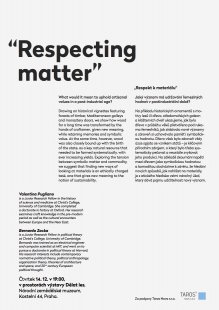
Valentina Pugliano & Bernardo Zacka: Respecting matter
Source
Národní zemědělské muzeum, Praha
Národní zemědělské muzeum, Praha
Publisher
Tisková zpráva
11.12.2017 20:55
Tisková zpráva
11.12.2017 20:55
Czech Republic
Prague
Letná
mjölk architekti
Lecture taking place: Thursday, December 14, 2017, at 7:00 PM at the exhibition venue Doing Forests, National Agricultural Museum, Kostelní 44, Prague.
Lecture partner: Taros Nova s.r.o.
Speakers:
Valentina Pugliano is a Junior Research Fellow in the history of science and medicine at Christ’s College, University of Cambridge.
Bernardo Zacka is a Junior Research Fellow in political theory at Christ’s College, University of Cambridge. Bernardo was trained as an electrical engineer and computer scientist at MIT, and went on to pursue a doctorate in political theory at Harvard. His research interests include contemporary normative political theory, political anthropology, organization theory, theories of architecture and space, and 20th-century European political thought.
What significance does upholding artisanal values have in a post-industrial age?
Using historical examples of ornaments with motifs of forests or wood, Mediterranean galleons, and monastery doors, we demonstrate how wood has been transformed over the ages by the hands of craftsmen, gaining new meanings while retaining memory and symbolic value. However, wood has also always been closely linked to the emergence of states—it is a key natural resource that needed to be systematically managed and its production continually increased. Based on the exploration of the tension between wood as a symbolic value and a commodity, we conclude that seeking new ways to perceive materials is an ethically demanding task that gives new meaning to the concept of sustainability.
What would it mean to uphold artisanal values in a post-industrial age?
Drawing on historical vignettes featuring forests of timber, Mediterranean galleys, and monastery doors, we show how wood for a long time was transformed by the hands of craftsmen, given new meaning while retaining memories and symbolic value. At the same time, however, wood was also closely bound up with the birth of the state as a key natural resource that needed to be farmed systematically, with ever-increasing yields. Exploring the tension between symbolic matter and commodity, we suggest that finding new ways of looking at materials is an ethically charged task, one that gives new meaning to the notion of sustainability.
More information >
Lecture partner: Taros Nova s.r.o.
Speakers:
Valentina Pugliano is a Junior Research Fellow in the history of science and medicine at Christ’s College, University of Cambridge.
Bernardo Zacka is a Junior Research Fellow in political theory at Christ’s College, University of Cambridge. Bernardo was trained as an electrical engineer and computer scientist at MIT, and went on to pursue a doctorate in political theory at Harvard. His research interests include contemporary normative political theory, political anthropology, organization theory, theories of architecture and space, and 20th-century European political thought.
What significance does upholding artisanal values have in a post-industrial age?
Using historical examples of ornaments with motifs of forests or wood, Mediterranean galleons, and monastery doors, we demonstrate how wood has been transformed over the ages by the hands of craftsmen, gaining new meanings while retaining memory and symbolic value. However, wood has also always been closely linked to the emergence of states—it is a key natural resource that needed to be systematically managed and its production continually increased. Based on the exploration of the tension between wood as a symbolic value and a commodity, we conclude that seeking new ways to perceive materials is an ethically demanding task that gives new meaning to the concept of sustainability.
What would it mean to uphold artisanal values in a post-industrial age?
Drawing on historical vignettes featuring forests of timber, Mediterranean galleys, and monastery doors, we show how wood for a long time was transformed by the hands of craftsmen, given new meaning while retaining memories and symbolic value. At the same time, however, wood was also closely bound up with the birth of the state as a key natural resource that needed to be farmed systematically, with ever-increasing yields. Exploring the tension between symbolic matter and commodity, we suggest that finding new ways of looking at materials is an ethically charged task, one that gives new meaning to the notion of sustainability.
More information >
The English translation is powered by AI tool. Switch to Czech to view the original text source.


0 comments
add comment










